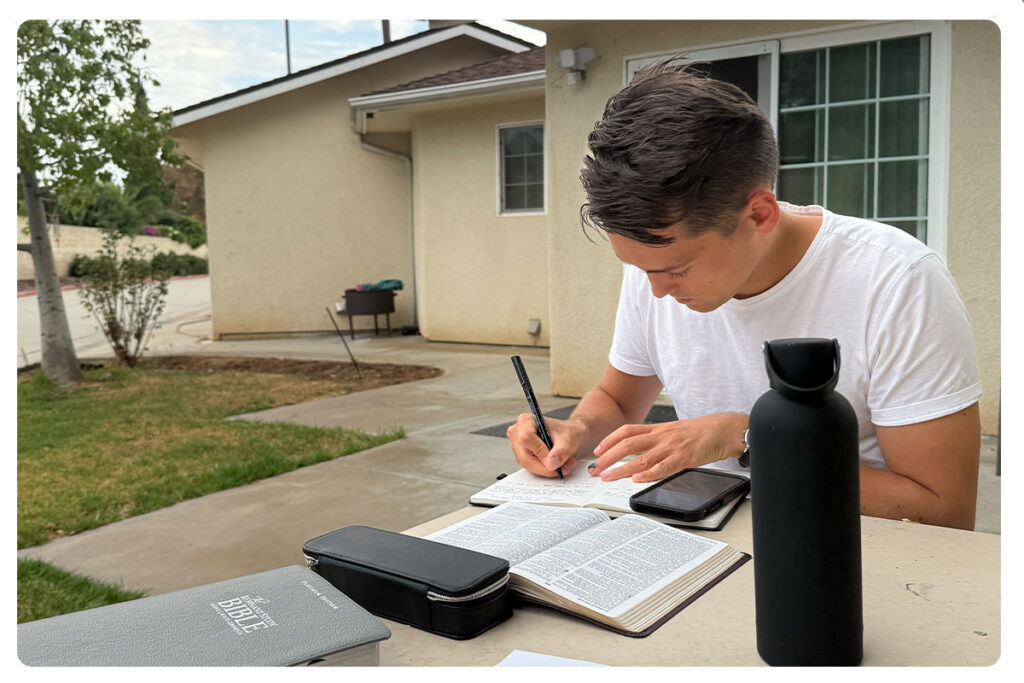- Vincent Bujor
No Plane Ticket Needed
Have you ever served as a missionary?
My wild guess is you haven’t. Only a small percentage of Christians in the U.S. have served as missionaries in foreign countries.¹ While over 2 million Christians go on short-term mission trips every year, many would not label themselves as missionaries, although they have preached and helped people in another country for a few weeks here and there.²
Why wouldn’t you call yourself a missionary, though? What is your perception of a true missionary? Do we have to travel far, engage with people from another ethnicity, and baptize them in unreached regions? Is that the definition of a biblical missionary?
Many people today would probably agree that the traditional image of a Western missionary is flawed. Zealous white people’s behavior to go to the “heathen in foreign lands” to preach (but also to colonize, exploit, and force their worldview on them) doesn’t sound very Christlike. That is why the idea of foreign missions has received much criticism in the last century. I just remember how a close family member shared John Allen Chau’s story with me shortly after it happened, criticizing people’s unethical desire to coerce others.
I would suggest that when Jesus gave us the Great Commission, He was talking about more than just traveling to reach the lost. First, we have to acknowledge that our itinerary might look different today. The majority of the world’s church members are now located in Asia, Africa, and South America — totaling a remarkable 89.8% of global membership.³ So why would someone from a 5% region like North America — or even better, a 1% region like Western Europe — call themselves a missionary when trying to reach the “unreached” in a country that has more churches than their own does members?⁴
Don’t misunderstand me, there is still a need to go out and preach the everlasting gospel to the whole world. In fact, there are areas in the Middle East and North Africa that desperately need missionaries right now. And yes, we can still go to East Central Africa, too. But remember Jesus’ words to His disciples:
“…you will receive power when the Holy Spirit has come upon you; and you shall be My witnesses both in Jerusalem, and in all Judea and Samaria, and even to the remotest part of the earth.”
Acts 1:8 (NASB)
Jesus told His disciples to start in Jerusalem. That’s the city where they were. Then, He tasked them to go to the entire region of Judea and Samaria, and eventually “to the remotest part” of our planet.
Do you know how you become a missionary in your city?
You downgrade your lifestyle. You live a more sacrificial life, helping those who really need it.
I didn’t really understand what that meant until God called my wife and me to move to California. He had given us a beautiful villa in Bavaria with a stunning view of the German forest. There was a golf course just beyond the hill; we saw deer and beavers and breathed fresh air every morning. The LORD had even blessed us with a wonderful BMW to explore the country. But after my wife earned her degree, we weren’t sure where to go next. So we prayed and fasted, seeking God’s guidance. Where would He send us?
We eventually realized that God was calling us to Southern California. It wasn’t easy—especially for my wife. You can probably imagine how our friends and family reacted. To them, our announcement sounded almost like a joke—an oxymoron. “We’re moving to Southern California to be missionaries. God is calling us there.” Really? Wasn’t that just a spiritual façade to justify our desire to relax at the beach and drink boba every day?
When we arrived, we had to move 8 times within 2 months. We went from a peaceful villa in the German forest to a shared house with four other men, right behind a noisy parkway. Our BMW never saw the Californian sun; we switched to a Volkswagen. And that was just the beginning.
About a year after that, we felt the call to relocate again. This time, it was to an area with one of the nation’s highest car theft rates. A friend of mine called it the “armpit” of San Diego. It was only 30 minutes away from our first place, where the average house still listed at $1.5 million — but the difference was huge. As we exited the highway, we were confronted with the unsettling sight of drug addicts and homeless people struggling to make it through the day.

But we moved there. When God calls, you don’t want to say no. Now, we see people looking for food. We smell foul odors and walk around dirty places. At night, we see hundreds of cockroaches scuttling everywhere. We hear illegal car races down the street and reports of lost children next door. Our living space has become very modest—we have even less room than before—but there’s a new addition to our family.
The same person who confronted me with John Chau’s questionable missionary journey visited us in our new home. He was visibly shocked after his arrival and asked if we liked it there. I said, “God called us here. There is a need out here.” And that’s why we like it. We open our home, serve at church next door, and share God’s message of hope with those around us.
You might not have to move into a rough neighborhood to become a missionary. But ask yourself: Does your family really need 4 cars? Do you really have to eat out every day? Do you really use two TVs, three iPads, and five smartphones in your household? It might sound absurd to some, but that’s the reality. A friend of mine pays over $800 a month for his phone bill.
Being a missionary means living a sacrificial life for others. It means stepping out of your comfort zone to share the gospel with those in need. It means giving up something for Jesus that you really enjoy, so that one more person can go to heaven with you. You can be a missionary at home, every day of your life, without ever flying to Papua New Guinea. Let go of that pernicious habit and use your time and resources to selflessly serve others.
You can invite your neighbors over, share a meal with them, and show genuine interest in their lives. You can cancel your Netflix subscription and donate that money so that one more child can get an Adventist education. You can reduce your hours or change jobs in order to serve at your local church each week. Becoming a missionary might actually mean to sell one of your cars, downgrade your phone, or cancel your favorite subscription. It means denying yourself and taking up your cross while everyone around you indulges in appetite, entertainment, and selfishness. Imagine how much more time and resources you would have if your main goal were to serve others every single day.
“For even the Son of man did not come to be served, but to serve, and to give His life as a ransom for many.”
Mark 10:45 (NASB)
My wife and I are missionaries — and out of all places, we’re missionaries in Southern California. Do you want to be one too?
Share Article
More articles
¹ It is pretty difficult to estimate the exact percentage of both traditional long-term missionaries, but various sources report that about 120,000-135,000 people go abroad for long-term missions every year. See also Joe Carter, “The U.S. Sends—and Receives—More Christian Missionaries Than Any Other Country” (February 2012), published here.
² See also Caleb Galaragal’s “Lausanne Report: Most Missionaries Are Reaching the Reached” article from Christianity Today (September 2024).
³ A detailed report of current membership trends can be found at the Adventist Office of Archives, Statistics, and Research.
⁴ Sounds a little crazy, but it could happen. If an Austrian missionary went to Kenya, he would find over 8,200 churches, almost double the amount of churches than he has members in his home country. There were 4,425 members in Austria and 8,246 churches in Kenya as of 2024. Although Kenya is much larger and over six times more populous, it disproves the myth that Africans need white evangelists.



